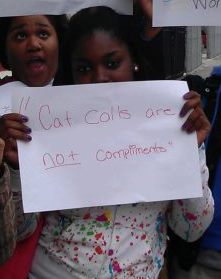Dr. Dena Simmons, New York City, USA, Blog Correspondent

“Leave me alone,” I screamed. Stop it! Stop!
But he kept inserting himself into my space no matter how hard I pushed him away.
I was in sixth grade when one of the boys from seventh grade cornered me so that he could grope me. After taking what he wanted, he left me in a corner, violated.
This inappropriate touching was an unwelcomed part of my middle school years. During class trips, during transitions in the hallways, at lunch, and at recess, the boys would sneak free-feels of the girls’ butts for fun. Many of us girls disliked the sexual harassment, but back then, no one did anything to protect us. We did not even have the vocabulary to describe what was happening to us.
Worse, one of my male English teachers would gently pinch my ears and stomach and rub my shoulders intimately, which made his class an unwelcomed part of my middle school years. I had no power to tell him to stop. I felt paralyzed by his actions. He touched other girls inappropriately too—without any shame. Fed up, I organized a movement against his casual touching, which included having our parents come into school to complain about his behavior. The principal reprimanded him, but he kept his job.
I never felt justice from reporting my teacher’s unwanted touches or the harassment from my male classmates—and still today, I walk the streets of New York City, subject to harassment that, for me, began between the walls of my school. Too often, young feminine bodies are sexually objectified in the very school buildings that should keep them safe. As a teacher, I would walk through the hallways and hear adolescent boys throwing their bravado around through derogatory comments about their female-bodied peers.
I can’t wait to hit that!
Did you see her ass?
I like her boobs.”
I hear she’s easy. You should go for her.
I want to fuck her.
I would hear stories from my female students who complained about the ways their male peers touched them when no one was looking, the way it bothered and distracted them from learning. Similar to when I was a middle schooler, many teachers did little to address the unwanted touching and the verbal harassment about which our students complained. Often times, these events happened when we were not looking. Most teachers and school leaders never learn how to handle the inappropriate touching that happens between students at school.
How are we supposed to have safer streets if we have not prepared adults at school to keep our school communities safe from harassment, safe from victimization and bullying?
Our pedagogy as a nation has been so watered down with test preparation that there are so few opportunities to teach students to be respectful and kind to people regardless of their differences, to have conversations about feminism, sexism, and gender with students and colleagues, and to teach lessons about power and privilege among other topics. There is so much work to do.
As adults, parents, school leaders, big brothers, uncles, teachers, and fathers, let’s do more for our youth. Let’s call out street harassment and other forms of victimization when we see it. Let’s build our youth’s problem-solving skills, empathy, self- and social awareness, and conflict resolution abilities. And, let’s model the type of respectful, thoughtful, and loving behavior we want to see in our youth.
Dr. Dena Simmons serves as the Associate Director of Education and Training at Yale’s Center for Emotional Intelligence. She is a recent graduate of Teachers College, Columbia University, where her research focused on teacher preparedness to address bullying in the middle school setting.
